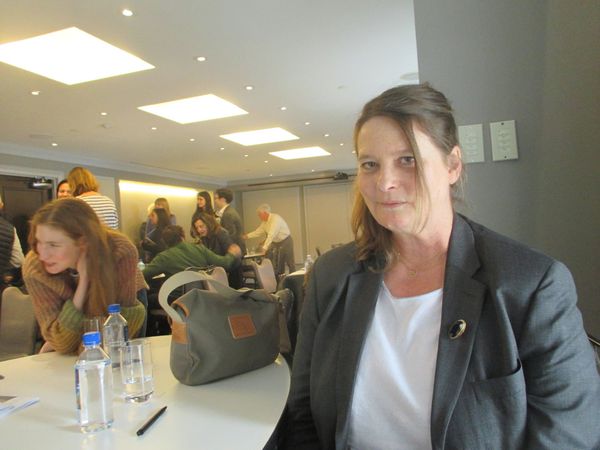The French title, La Belle Et La Belle, a take on Beauty And The Beast with no beast and two beauties, sets the tone that this is a tale of magic that speaks of deeper meaning in the language of whimsy, not science. What would you do if you could meet yourself, only 25 years older, or younger, respectively? Would you smile at what you became or what you once were?
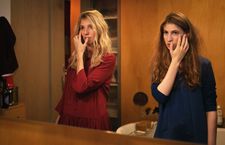 |
| Sophie Fillières on Margaux (Sandrine Kiberlain) and Margaux (Agathe Bonitzer): "If I were to meet myself I would definitely go insane." |
This is the premise of Sophie Fillières' When Margaux Meets Margaux, starring Sandrine Kiberlain and the director's daughter Agathe Bonitzer as the title character(s). Melvil Poupaud plays Marc, a catalyst who leaves his mark on both women. It is his perspective that probably best lets us enter the playful premise of age folding in on itself. What do you love most in a person? Is it memory of past experiences together or their unchanging core or the freshness of surprise?
Whereas the 20-year-old Margaux mostly applies the poker face cool her age group demands, Kiberlain revels in fine-tuned screwball comedy timing. Her gung-ho approach to the absurdity of meeting her younger self and thus the chance to change her fate, is as casual as it is unexpected.
At the Loews Regency Hotel on Park Avenue inside The Great Lawn during Rendez-Vous With French Cinema, Sophie Fillières discussed her film with me while we had lunch.
Anne-Katrin Titze: Let's start with the title. The French title La Belle Et La Belle is clearly a hint at La Belle Et la Bête. It doesn't work in English without the beast - as Beauty And Beauty.
Sophie Fillières: The Beauty and the Beauty - no that doesn't sound very ...
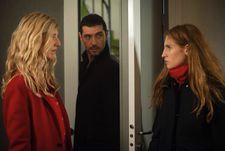 |
| Margaux (Sandrine Kiberlain), Marc (Melvil Poupaud) and Margaux (Agathe Bonitzer) |
AKT: Is it the fairy-tale quality, though, that you were going for?
SF: Yes, there is quite a deliberate aspect to the title. Actually I had found the title even before I started writing the film. I had a vague idea of wanting to work with two female characters and I thought La Belle Et La Belle would be a nice title.
But in some vague way it's a reference to the fable, the fairy tale. In the sense that you need a fairly great deal of imagination to enter this imaginary bet of believing that they're the same person. So there's a fairy-tale quality to it, yes.
AKT: Freud said that if you were to meet your double, you would go insane immediately. By making this self in two different ages, having a 25-year age difference, maybe you don't go insane? Only a little bit?
SF: I think I would. If I were to meet myself I would definitely go insane. Or say something like "There you are!" and run away, if I met myself younger. Here I think it's the right amount of time in between the two ages. Because in the young Margaux there's something that's simmering of her later age and in the older Margaux there's something that's still boiling of her younger age.
 |
| Marc (Melvil Poupaud) with Margaux (Sandrine Kiberlain): "I like this idea, how to not miss your train, your own train." |
AKT: The two of them are colour-coded!
SF: They are.
AKT: Red and blue until at a later point ...
SF: It switches around. With my costume designer [Carole Gérard] we talked about how they were to be dressed. I wanted them really like, you know, comic strip characters. Very well silhouetted. I wanted them to have a very definite silhouette. So I thought - why not attribute a colour to each one of them? It was a big discussion who should be blue and who should be red at the start.
Because with Sandrine Kiberlain's blue eyes I thought she would look good in blue. And Agathe [Bonitzer, Sophie's daughter] with the red hair she would look good in red. And I thought, no, let's swap it around. Agathe turned out to be blue and Sandrine red. And then when they start both sleeping with Marc [Melvil Poupaud], the male character, it sort of starts mingling. One has a red scarf, the other one has a blue sweater. And it capsizes when they're at the ski mountain.
AKT: And there's another character on the mountain who is almost like a third Margaux coming by.
SF: Of course, yeah. The eldest Margaux, yes. And she has a red cap and blue jacket and the way they look at each other, it's like in an instance there's a flash forward to what they could both become. That also unites them really at the end, the two Margauxs, because they see a third one. It was difficult to cast this lady, because she had to have a skin quality and hair. She was just an extra. She's not a real actor.
 |
| Sophie Fillières on the colours for Margaux (Sandrine Kiberlain) and Margaux (Agathe Bonitzer): "It was a big discussion who should be blue and who should be red at the start." |
AKT: The party scene where the two Margauxs meet has a universal quality. There's something that doesn't seem to age about those kinds of parties. There's always somebody smug who doesn't know anything - Bocuse for example. [The young man at the party had never heard of world-famous chef Paul Bocuse.]
SF: Yeah, I wanted to put the elder Margaux in a different situation where they are all younger than her. This Bocuse thing was important to underline that. I really wanted her to be quite gauche and maladroite.
AKT: Clumsy.
SF: Clumsy in this atmosphere of young people. It's also, how did she end up there? We sort of understand that she was supposed to meet somebody's son - the son of somebody's friend. It was very visual for me to see her in red, in that dress, with all these young people. And the way she sways, not really in a definite way, but she sort of sways to the music and everybody's busy talking to each other. I wanted that contrast.
AKT: Nothing makes the contrast clearer than when people don't know what you are talking about. Yesterday I was at lunch with Kyle MacLachlan and some young actors [he starred with in Giant Little Ones]. And I brought up Stanley Donen.
 |
| Marc (Melvil Poupaud) and Margaux (Agathe Bonitzer): "It capsizes when they're at the ski mountain." |
SF: Who just died. And they had no idea who he was?
AKT: Kyle knew, of course.
SF: Of course.
AKT: And we talked about his favorite Donen films. But the boys had no idea who he was.
SF: That's amazing. And it's sort of for the old Margaux when she says, "Never mind, you'll find out soon enough." It's almost like "And it will be too late when you know it."
AKT: [at that moment, actor Pio Marmaï walks past our table] I have to throw him under the bus - Pio has never seen Vertigo. I just found out from him.
SF: Oh really? Wow. That's a hard thing - not to see it.
AKT: The idea of missing a train, not missing a train, the idea of doubles - I was thinking of Kieslowski.
SF: Oh yeah. Really frankly, I never thought of that. I know some of Kieslowski's movies, but I never - oh except they are in red and blue - but there is no relevance, I mean, not deliberately. But I like this idea, how to not miss your train, your own train. You've got to be on the way to where you're going. That sort of resonates when she tells her that.
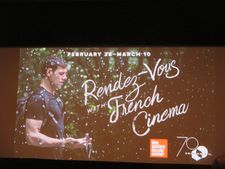 |
| Rendez-Vous With French Cinema at the Film Society of Lincoln Center Photo: Anne-Katrin Titze |
AKT: A scene that I love, that I've never seen in cinema is the thing with the carousel. The girl grabbing the dangling toy, it's a personal vivid memory for me. And then the line Margaux says to the carousel operator "It's nothing for you …
SF: "It's nothing for you and it's everything to her." Yes, it was very important for me that scene. I had quite a lot of trouble editing it because it was much longer and somehow it had become too long.
It was important for the character of young Margaux to find something deep inside of her childhood. To really go down inside some kind of feeling of injustice and of this sort of pervert, almost sort of pervert guy, who fools around with this little girl - who is a possible younger, very childhood Margaux.
AKT: Oh, I didn't even pick up on that.
SF: It's not conscious really exactly, but when I look at the film I also see it like that. It's also about how to seize what you have to seize. To catch the thing is like sizing up with your life. In French it's called a pompon, this Mickey Mouse sort of stuffed animal. And I really wanted it to reappear at the end.
So when older Margaux gives it to young Margaux, it's like she gives her the means to let go of her childhood and to really drop out of it. That's why I love the way Agathe looks at the stuffed animal. She's interested but not really. Suddenly, it's her past.
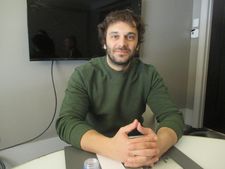 |
| Pierre Salvadori's The Trouble With You star Pio Marmaï has never seen Vertigo Photo: Anne-Katrin Titze |
AKT: Totally. That's a good description.
SF: And she's got a past, too. And she's going to move on.
AKT: From your film Gentille, I have a very vivid memory of Emmanuelle Devos just walking through the Paris streets and letting herself be caught by the city. I don't know how to express it.
SF: Yes, be caught by the city. Wanting to go to Notre-Dame, or wanting to have her portrait drawn.
AKT: Although you live somewhere, you allow yourself to be in a tourist situation.
SF: It's funny that you remember that.
AKT: It's the openness to the place where you are right here, right now, that you captured. There's a bit of that in this film, too.
SF: I like to film cities - here we shot in Paris and in Lyon and then the ski resort. I really like to film the locations. It was the same thing with Gentille and Paris - I really wanted it to be grasping the touristy aspects.
For example in Lyon we shot in places that are very recognizable. I like to grasp how we give away the France, the country that we are. I like to give that. I don't go into dark alleys; it's always very frontal. I like how places determine us.








